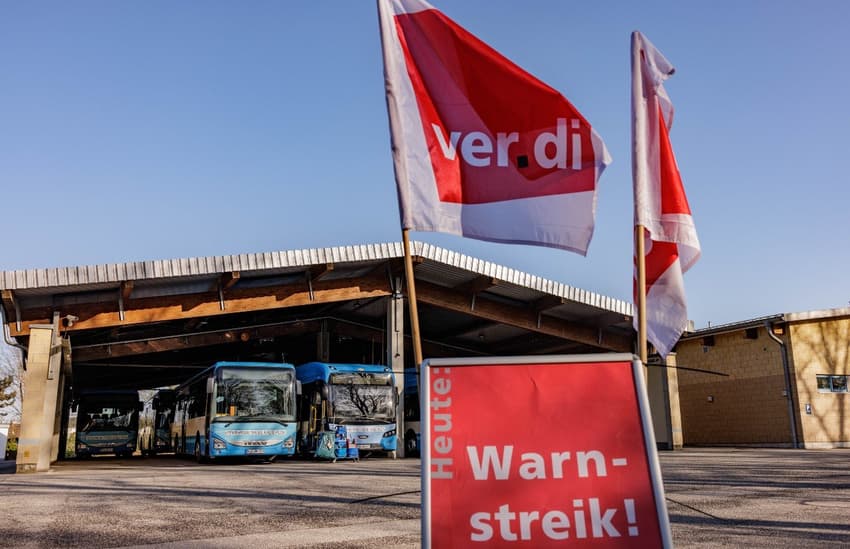Bavaria hit by more transport disruption as bus drivers continue strike

The union Verdi has called for full-day strikes for bus drivers in three Bavarian cities on Tuesday and Wednesday - part of a larger wave of actions for higher wages and better working conditions.
Bus services in the cities of Bamberg, Landshut and Passau will only be running on limited routes through to the end of the day on Wednesday.
In Landshut all transport will be affected, with the exception of line 9 (Altstadt - Hauptbahnhof - Münchnerau - Gündlkoferau) as well as the school and commuter lines 528, 529, 533, 534, 568, 574, 576 and 577.
All bus service in Passau and Bamberg - including school buses - is also set to be brought to a halt.
Part of ongoing strikes
The strikes follow a larger action which took place on Friday, in which Verdi paralysed traffic in 10 Bavarian cities in the ongoing battle for higher wages.
Verdi struck a deal for a 5.5 percent pay raise for public sector workers throughout Germany in April, putting an end to months of nationwide strikes not just in several public transport companies, but also at Kitas (daycare centres), rubbish collection, and administrative offices.
READ ALSO: German public service workers clinch 5.5 percent pay raise
However, a separate collective agreement applies to the approximately 7,000 employees at local public transport companies throughout Bavaria, including Munich.
Verdi, which is in its fifth round of collective bargaining with employers, is not only demanding higher wages but also better working conditions, including improved working hours.
The Bavarian Association of Municipal Employers has continued to reject their demands, and Verdi has threatened ongoing strikes throughout the southern state until a settlement is reached.
Long-distance transport strikes
The local strikes in Bavaria come as transport union EVG holds a three-day-long meeting with Deutsche Bahn in Fulda, situated in the state of Hesse, over higher wages for its approximately 180,000 members nationwide.
The union is negotiating the same demands with 50,000 members at dozens of other railway companies throughout Germany - including some smaller ones in Bavaria such as Bayerische Oberlandbahn (BOB) and Bayerische Regiobahn (BRB).
READ ALSO: Strikes: Deutsche Bahn to resume talks with Germany's largest rail union
It has already brought rail traffic in Germany to a standstill twice in the past couple of months with nationwide warning strikes.
An agreement with the state-owned Deutsche Bahn will probably also set the course for negotiations with the other companies. However, if no agreement is reached by the end of the day on Thursday, DB has threatened unlimited strikes throughout the country.
The wave of strikes - at both large and small, and regional and national companies - comes as Germany is experiencing record-high inflation.
Inflation has cooled slightly in recent months but remained very high in April at 7.2 percent.
Comments
See Also
Bus services in the cities of Bamberg, Landshut and Passau will only be running on limited routes through to the end of the day on Wednesday.
In Landshut all transport will be affected, with the exception of line 9 (Altstadt - Hauptbahnhof - Münchnerau - Gündlkoferau) as well as the school and commuter lines 528, 529, 533, 534, 568, 574, 576 and 577.
All bus service in Passau and Bamberg - including school buses - is also set to be brought to a halt.
Part of ongoing strikes
The strikes follow a larger action which took place on Friday, in which Verdi paralysed traffic in 10 Bavarian cities in the ongoing battle for higher wages.
Verdi struck a deal for a 5.5 percent pay raise for public sector workers throughout Germany in April, putting an end to months of nationwide strikes not just in several public transport companies, but also at Kitas (daycare centres), rubbish collection, and administrative offices.
READ ALSO: German public service workers clinch 5.5 percent pay raise
However, a separate collective agreement applies to the approximately 7,000 employees at local public transport companies throughout Bavaria, including Munich.
Verdi, which is in its fifth round of collective bargaining with employers, is not only demanding higher wages but also better working conditions, including improved working hours.
The Bavarian Association of Municipal Employers has continued to reject their demands, and Verdi has threatened ongoing strikes throughout the southern state until a settlement is reached.
Long-distance transport strikes
The local strikes in Bavaria come as transport union EVG holds a three-day-long meeting with Deutsche Bahn in Fulda, situated in the state of Hesse, over higher wages for its approximately 180,000 members nationwide.
The union is negotiating the same demands with 50,000 members at dozens of other railway companies throughout Germany - including some smaller ones in Bavaria such as Bayerische Oberlandbahn (BOB) and Bayerische Regiobahn (BRB).
READ ALSO: Strikes: Deutsche Bahn to resume talks with Germany's largest rail union
It has already brought rail traffic in Germany to a standstill twice in the past couple of months with nationwide warning strikes.
An agreement with the state-owned Deutsche Bahn will probably also set the course for negotiations with the other companies. However, if no agreement is reached by the end of the day on Thursday, DB has threatened unlimited strikes throughout the country.
The wave of strikes - at both large and small, and regional and national companies - comes as Germany is experiencing record-high inflation.
Inflation has cooled slightly in recent months but remained very high in April at 7.2 percent.
Join the conversation in our comments section below. Share your own views and experience and if you have a question or suggestion for our journalists then email us at [email protected].
Please keep comments civil, constructive and on topic – and make sure to read our terms of use before getting involved.
Please log in here to leave a comment.